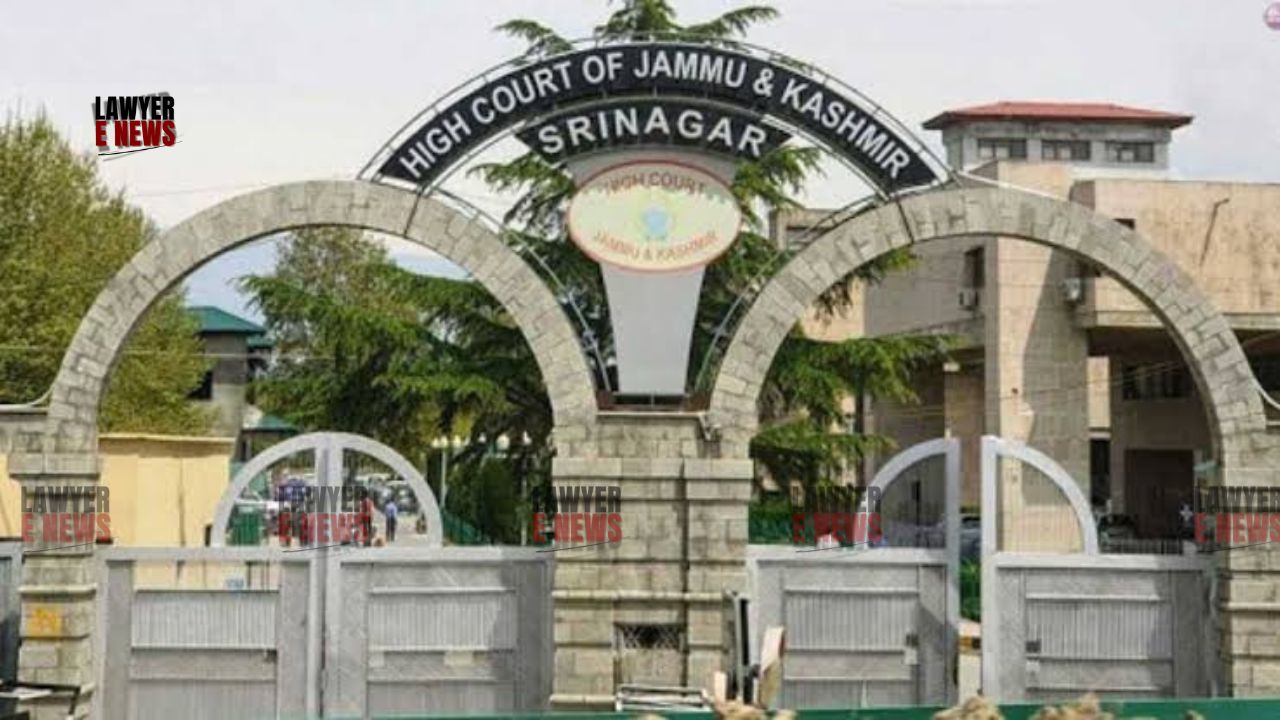-
by Admin
15 February 2026 5:35 AM



In a significant ruling, the High Court of Jammu & Kashmir and Ladakh dismissed an appeal filed by United India Insurance Company Limited for being barred by limitation under the Employees’ Compensation Act, 1923. The Court, in its judgment dated November 19, 2024, held that the statutory limitation period of 60 days for filing an appeal cannot be extended on the basis of time spent pursuing a legally untenable review petition. The Court also emphasized that filing a review petition—a remedy not provided under the Act—does not stop the limitation clock for filing an appeal.
Justice Vinod Chatterji Koul, while delivering the judgment, underscored the principle that "bona fide litigation must be pursued within the bounds of legal remedies provided under the law." The appellant's failure to act within the prescribed limitation period proved fatal to the case.
The dispute arose from a compensation award passed on April 26, 2022, by the Commissioner under the Employees’ Compensation Act, 1923. The award of ₹10,63,636/- was made in favor of Sharda Devi and others, dependents of a deceased worker who died in the course of employment. The Commissioner directed the insurance company to deposit the compensation amount within 30 days.
Instead of filing an appeal under Section 30 of the Act, which mandates a 60-day limitation period, the insurance company filed a review petition before the Commissioner, seeking to recall the award. The Commissioner dismissed the review petition on July 23, 2022, stating that such a remedy was not maintainable under the Act. Following this dismissal, the insurance company deposited the award amount on September 12, 2022, and subsequently filed an appeal on September 15, 2022—well beyond the 60-day limitation period.
The Court noted that the Employees’ Compensation Act, 1923, does not provide for a review mechanism. Justice Koul stated:
"Filing a review petition, instead of pursuing the remedy of appeal, constitutes a misuse of process. The time consumed in pursuing a legally untenable remedy cannot be excluded for the purpose of calculating limitation."
Under Section 30 of the Employees’ Compensation Act, an appeal must be filed within 60 days of the award. Justice Koul emphasized:
"The statutory limitation period cannot be extended indefinitely by invoking remedies not provided under the Act. The appellant failed to act diligently within the prescribed period."
Pre-Deposit Requirement Does Not Cure Delay
The appellant complied with the mandatory pre-deposit of the award amount—a precondition for filing an appeal—only after the expiration of the limitation period. The Court held that this compliance, though necessary, does not override or extend the limitation period for filing an appeal.
The appellant argued that the time spent in filing and pursuing the review petition should be excluded on the grounds of bona fide litigation. The Court rejected this contention, observing:
"The appellant failed to demonstrate that the review petition was pursued in good faith or due to a genuine mistake. Mere reliance on a legally impermissible remedy cannot justify the exclusion of time for limitation purposes."
Justice Koul referred to the Supreme Court’s ruling in State of Punjab v. Mohinder Singh Randhawa, where it was held that time consumed in pursuing a non-maintainable remedy cannot be excluded for limitation purposes. He further noted that bona fide litigation requires proof of honest intention and due diligence, both of which were absent in this case.
"The Employees’ Compensation Act, 1923, is a welfare legislation that provides a strict limitation period for appeals to ensure timely justice to dependents of workers. Misusing the legal process by filing non-maintainable petitions frustrates the purpose of the Act."
"Bona fide litigation requires not just good intentions but also adherence to the law. Pursuing a remedy that is not legally available cannot be excused as a bona fide mistake."
The High Court dismissed the appeal filed by United India Insurance Company Limited, holding that it was filed beyond the statutory limitation period of 60 days and that no sufficient cause was shown for condoning the delay. The Court further held that the review petition filed by the insurance company was not maintainable under the Act and did not justify the delay in filing the appeal.
"The appellant cannot be permitted to circumvent statutory timelines by invoking remedies not contemplated under the law. The limitation period under Section 30 of the Employees’ Compensation Act is mandatory, and no exceptional circumstances exist in this case to warrant its extension."
This judgment underscores the importance of adhering to statutory timelines and pursuing remedies within the framework of the law. By dismissing the appeal, the High Court reinforced the principle that limitation periods under welfare legislations like the Employees’ Compensation Act must be strictly construed to ensure the timely delivery of justice to beneficiaries.
Date of Decision: November 19, 2024
